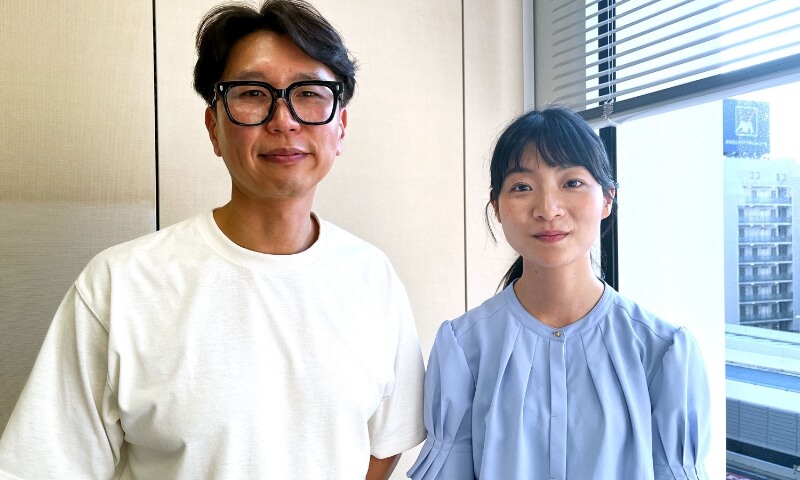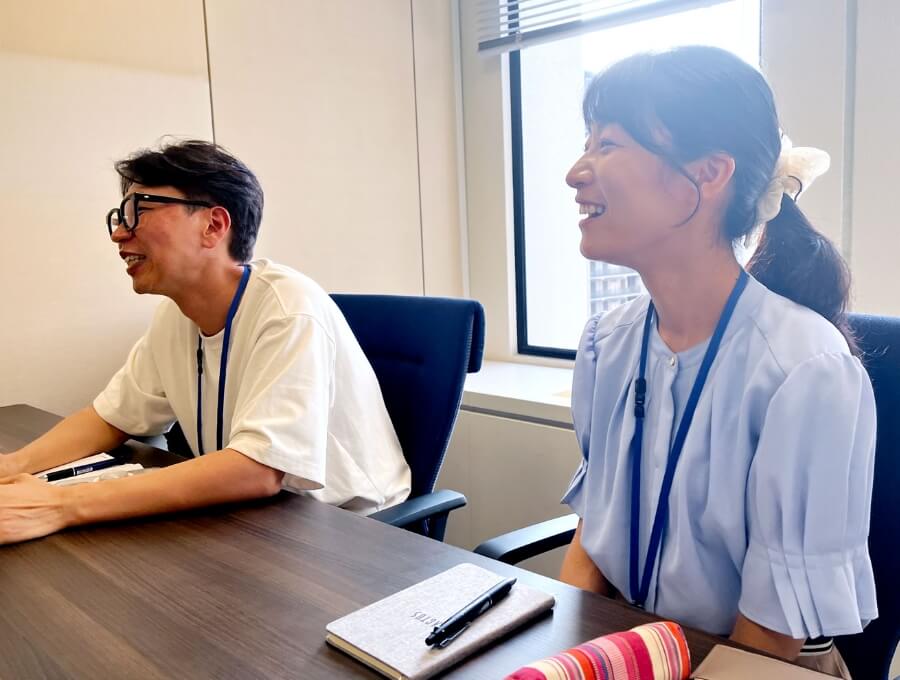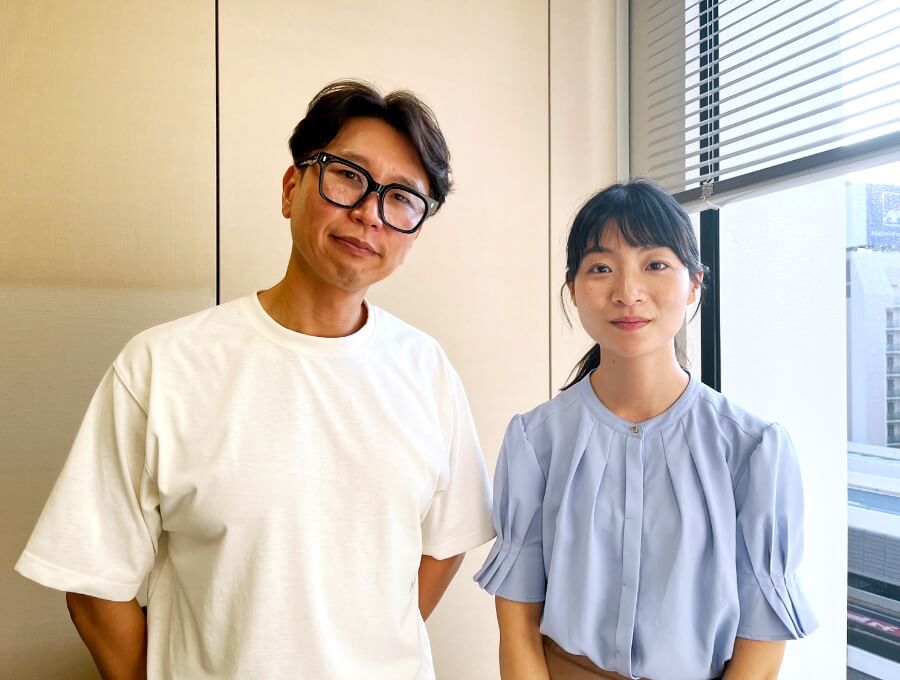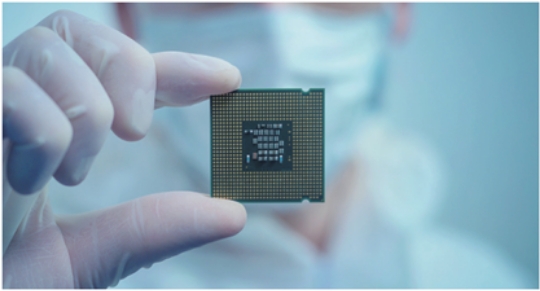
Pebble Square Japan, Inc.
ChoongHyun Lee, CEO
Emi Kiyokawa, General Affairs
We spoke with ChoongHyun Lee, CEO of Pebble Square Japan, and Emi Kiyokawa from the General Affairs department.
Offline AI That Fits in the Palm of Your Hand: Pebble Square's Quest for Privacy and Assurance in Technology
QTo start with, could you tell us about your company and your interest in the Japanese market?
Our company is a fabless AI semiconductor startup headquartered in Pangyo, South Korea. Established in September 2021, we currently have bases in South Korea, Japan, and China, and we have built a research and development team with approximately 40 members. After completing my master’s and doctoral programs at the University of Tokyo, I was involved in research on neuromorphic AI at IBM Research. However, I felt the limitations of conventional semiconductor architectures in achieving brain-like processing akin to human cognition, which led me to start my own company.
I believe the Japanese market is highly compatible with our initial overseas expansion due to its advanced technological maturity and strong focus on quality. Additionally, having lived in Japan for a long time, I also understand the culture. Another significant reason is that my family also lives in Japan, and we have established a livelihood here.
QWhat challenges do you perceive when entering the Japanese market?
Japan is a highly attractive market from a technological standpoint, and the commitment to quality and high level of social trust present great appeal for us in deploying our technology. On the other hand, while infrastructure-related procedures such as opening a bank account or registering a corporation require a certain amount of time and work, I feel that it is precisely because these systems are well-structured that there is a reliable foundation for conducting business over the long term.
Additionally, in business negotiations with Japanese companies, there is a cultural tendency to invest time in building trust. I believe that once a relationship is established, this becomes a strength that leads to long-term, stable partnerships. We view the process of building a track record through PoCs as an excellent opportunity to collaboratively create value while experiencing the technology firsthand.
QCould you tell us about the strengths of your company's technology and what industries it can contribute to?
 Our greatest strength lies in our AI-dedicated semiconductor chips that utilize Processing-In-Memory (PIM) architecture. In traditional architecture where the CPU and memory are separated, data transfers consume a significant amount of power and time. However, the PIM approach allows for direct processing within memory, enabling ultra-low power consumption and highly efficient AI inference.
Our greatest strength lies in our AI-dedicated semiconductor chips that utilize Processing-In-Memory (PIM) architecture. In traditional architecture where the CPU and memory are separated, data transfers consume a significant amount of power and time. However, the PIM approach allows for direct processing within memory, enabling ultra-low power consumption and highly efficient AI inference.
This technology enables on-device AI without the need for an internet connection, making it ideal for fields where privacy protection and real-time performance are essential. For battery-powered products such as those that monitor seniors, fire detection devices, voice-operated home appliances, IoT devices, and wearable gadgets, it enables advanced AI processing while significantly reducing power consumption.
QWhat kind of collaboration are you hoping for with Japanese companies?
We hope to collaborate with mid-sized companies that can act swiftly, as well as housing manufacturers and electronics manufacturers with flexible development systems, local governments, and universities. Major corporations tend to take time for validation and approval. Therefore, we believe it is pragmatic to first build a track record and establish trust through PoCs.
Our company is capable of not only supplying chips, but also engaging in IP licensing, AI algorithm development, custom chip design, and solution development. We have established a system that allows us to flexibly provide technology and engage in joint development tailored to the challenges faced by Japanese companies.
QAre you currently moving forward with any PoCs or business negotiations in Japan?
Yes. We have already established a distributor agreement with a subsidiary of a major Japanese corporation and have completed several PoCs. We are preparing to deploy products utilizing voice and image recognition for Japanese homes and senior care facilities. In the PoCs, we integrated our company’s chip into existing products and achieved highly practical outcomes, such as enabling voice operation and anomaly detection without an Internet connection.
Our flagship product, MINT, boasts a processing capability of 30 GOPS while consuming only 12 mW of power. By integrating it into existing MCUs and IoT devices, it is possible to add AI functionality while also extending battery life.
QCould you please tell us about the price range of the product and the costs involved in its implementation?
At the PoC stage, we anticipate a development period of three to four months with a budget of approximately 2 million yen. Mass-producible chips are very compact (5×5 mm² to 20×20 mm²) and can be integrated into existing products. In addition, our model is designed for a one-time purchase, eliminating the need for monthly subscriptions, making it an accessible option for municipalities and public institutions.
Our product line includes MOCHA for voice, MINT for both image and voice processing, PAPAYA with dual-core capabilities, and ESPRESSO for high-performance needs, providing a selection according to your specific application.
QPlease share a message for companies located in Tokyo.
 Our company aims to deliver AI as a technology that fits in the palm of your hand. Our mission is to address social issues through technology, such as supporting vulnerable populations, disaster prevention, and improving energy efficiency. We aim to create a world where on-device AI can assist individuals in real-time while protecting their privacy.
Our company aims to deliver AI as a technology that fits in the palm of your hand. Our mission is to address social issues through technology, such as supporting vulnerable populations, disaster prevention, and improving energy efficiency. We aim to create a world where on-device AI can assist individuals in real-time while protecting their privacy.
We warmly invite Japanese companies to engage with our technology, even if starting from a PoC, and we hope to collaborate as partners in creating new value together.
Case Studies

Overseas startups expanding into Tokyo
×
Tokyo companies
3-8-3 Marunouchi, Chiyoda-ku, Tokyo
Tokyo Innovation Base 1F
Square 1



